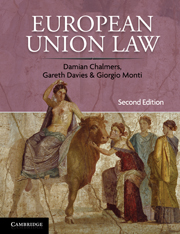Book contents
- Frontmatter
- Contents
- Map
- Preface
- Abbreviations
- Table of Cases
- Table of Treaties, Instruments and Legislation
- Table of Equivalents
- Electronic Working Paper Series
- 1 European Integration and the Treaty on European Union
- 2 The EU Institutions
- 3 Union Law-making
- 4 The EU Judicial Order
- 5 The Authority of EU Law
- 6 Fundamental Rights
- 7 Rights and Remedies in National Courts
- 8 Infringement Proceedings
- 9 Governance
- 10 Judicial Review
- 11 EU citizenship
- 12 EU Law and Non-EU Nationals
- 13 Equal Opportunities Law and Policy
- 14 EU Criminal Law
- 15 External Relations
- 16 The Internal Market
- 17 Economic and Monetary Union
- 18 The Free Movement of Goods
- 19 The Free Movement of Services
- 20 The Pursuit of an Occupation in Another Member State
- 21 Trade Restrictions and Public Goods
- 22 EU Competition Law: Function and Enforcement
- 23 Antitrust and Monopolies
- 24 State Regulation and EU Competition Law
- Index
5 - The Authority of EU Law
- Frontmatter
- Contents
- Map
- Preface
- Abbreviations
- Table of Cases
- Table of Treaties, Instruments and Legislation
- Table of Equivalents
- Electronic Working Paper Series
- 1 European Integration and the Treaty on European Union
- 2 The EU Institutions
- 3 Union Law-making
- 4 The EU Judicial Order
- 5 The Authority of EU Law
- 6 Fundamental Rights
- 7 Rights and Remedies in National Courts
- 8 Infringement Proceedings
- 9 Governance
- 10 Judicial Review
- 11 EU citizenship
- 12 EU Law and Non-EU Nationals
- 13 Equal Opportunities Law and Policy
- 14 EU Criminal Law
- 15 External Relations
- 16 The Internal Market
- 17 Economic and Monetary Union
- 18 The Free Movement of Goods
- 19 The Free Movement of Services
- 20 The Pursuit of an Occupation in Another Member State
- 21 Trade Restrictions and Public Goods
- 22 EU Competition Law: Function and Enforcement
- 23 Antitrust and Monopolies
- 24 State Regulation and EU Competition Law
- Index
Summary
INTRODUCTION
This chapter considers the authority of EU law. It is organised as follows.
Section 2 considers the claims by the Court of Justice that sovereignty is vested in the Treaties. This places ultimate legal authority in the Treaties and makes the Court of Justice the ultimate arbiter on the meaning and consequences of this authority. This has been given limited recognition by the national governments in a Declaration attached to the Treaty of Lisbon.
Section 3 considers the implications of these claims not being fully accepted by any national constitutional court. Whilst willing to grant the Treaties significant legal authority, all see their domestic constitutions, or some part of them, as sovereign. The authority of EU law rests, therefore, in the extent to which the claims of the Court of Justice are accepted by national constitutional courts and the principles on which the latter accept it. Instead of discussing sovereignty in abstract terms of whether EU law or domestic law is sovereign, it makes better sense to consider the extent to which the four different doctrines emanating from the sovereignty of EU law have been accepted.
Section 4 considers the first of these doctrines: the precedence of EU law over all national law, including national constitutions. There is almost no instance of a national constitutional court explicitly giving priority to a national law over EU law.
- Type
- Chapter
- Information
- European Union LawCases and Materials, pp. 184 - 227Publisher: Cambridge University PressPrint publication year: 2010
- 2
- Cited by

